The creation of music is a very personal thing, and yet in the 20th century the music industry made the creation and distribution of music an activity that required dozens of people, from audio engineers to producers to the agents. The artist was actually just a small piece of the entire puzzle.
Thanks to advances in technology, in the 21st century literally anyone can start a music career from their own homes using inexpensive software. And the distribution of that music no longer requires physical records or CDs and a complex web of relationships and distribution channels. Artists can freely distribute their own songs now, using digital channels to put their songs into the ears of fans and prospective fans.
 Putting Power in the Hands of Creators
Putting Power in the Hands of Creators And yet the entire network of music studios, audio producers, agents, distribution, middlemen, and other intermediaries still exists, acting as a leech on the back of the artists and creators. The artist and creator in the music industry is one of the largest thefts in existence.
In 2017 the music industry is said to have generated some $43 billion in sales, and yet just 12% of that went to the artists who were responsible for creating the music. Compare that with the NFL and NBA, where players capture on average anywhere from 47% to 51% of the revenue generated by the leagues.
It’s a crime that the centralized music production and distribution industry has been responsible for taking so much from the artists. But there’s now an alternative that will allow music artists to break free from the legacy institutions that have robbed them for so long.
Introducing Audius
Until now nearly all of the dApps being created and launched are in the gaming, gambling, or decentralized finance space, but that is beginning to change as creative teams work on solving problems outside these spaces through the use of dApps.
One of these new and creative uses is coming from the creators of Audius, which bills itself as the “world’s first decentralized music streaming platform.” Audius has been designed from the ground up to give musicians and other creators increased freedom, control, and flexibility when it comes to their own musical creations and the communities of fans surrounding them.
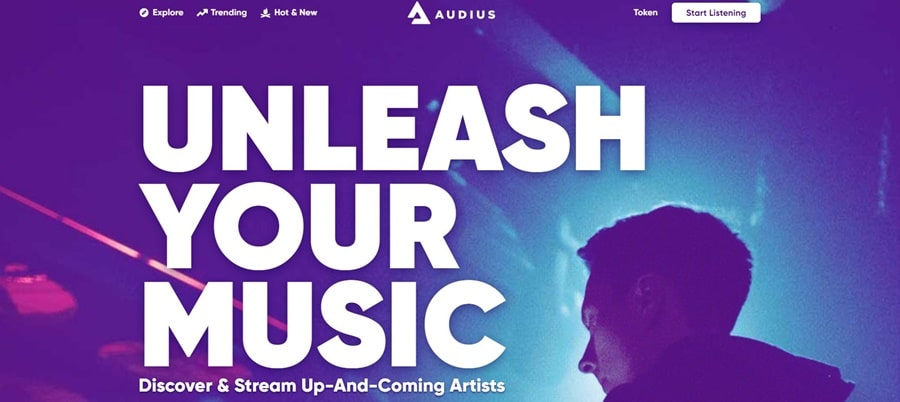 Audius could become the Soundcloud killer. Image via Audius.co
Audius could become the Soundcloud killer. Image via Audius.co One of the major parts of this platform is the $AUDIO utility token that was released alongside the mainnet in October 2020. The AUDIO token will eventually allow musicians and other creators to monetize their own creations in both traditional and new ways.
It also allows token holders to participate by securing the blockchain and receiving some of the network fees as an incentive for doing so. And token holders will also participate in the governance of the platform, while getting access to exclusive features in the future.
Already anyone at all is free to create an Audius account and get involved in the project. This includes the creators who upload new audio files to the platform, as well as fans who get involved by listening, liking, and reposting their favorite content from the platform. Audius can be accessed via mobile device, browser, or PC application.
Since being released in beta back in September 2019 Audius grew to over 500,000 monthly active users when it launched its mainnet in October 2020, with more than 1 million monthly streams. Metrics regarding the protocol’s growth can be tracked in real time using dashboard.audius.org.
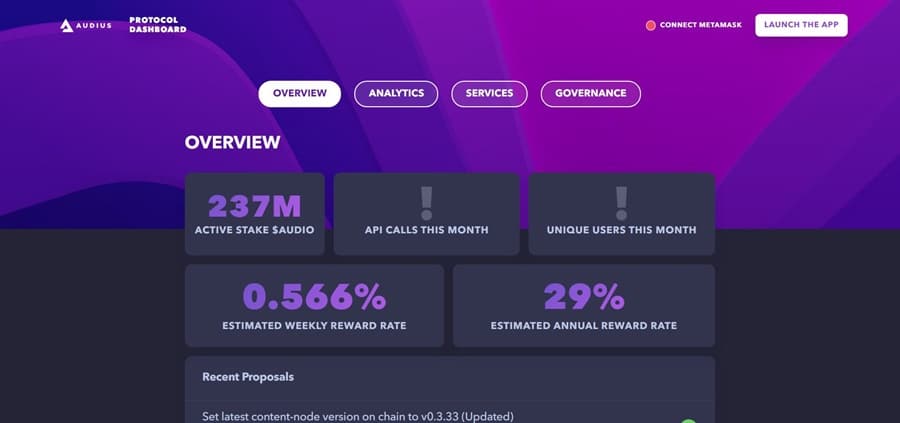 Keep track of staking, rewards, users, and more with the Dashboard. Image via Audius Protocol Dashboard.
Keep track of staking, rewards, users, and more with the Dashboard. Image via Audius Protocol Dashboard. Audius Mission
Audius was created with a mission to give anyone at all the freedom to stream, distribute, and monetize any type of audio content. With the Audius project fans and artists come together, joined by the node operators that make the network possible. All are joined by an incentive-based system that allows the different actors to provide a high-quality audio streaming experience that’s guided by the foundational beliefs of the Audius founders:
- Users should be compensated in proportion to how much value they create for the network
- Artists should directly engage with and transact with their fans
- Governance power should be earned by creating value in Audius, and shared consistently between user groups contributing to the protocol
- Prices and earnings for participants should be consistent, predictable, and transparent
- Access should be democratized; anyone can contribute to Audius if they follow the protocol rules, and all information is publicly accessible
- Intermediaries should be removed when possible; when necessary, they should be algorithmic, transparent, and verifiably accurate
Audius Technology
In order to deliver high quality audio while incentivizing the use of the platform the protocol was designed with five components that work together to deliver the Audius experience:
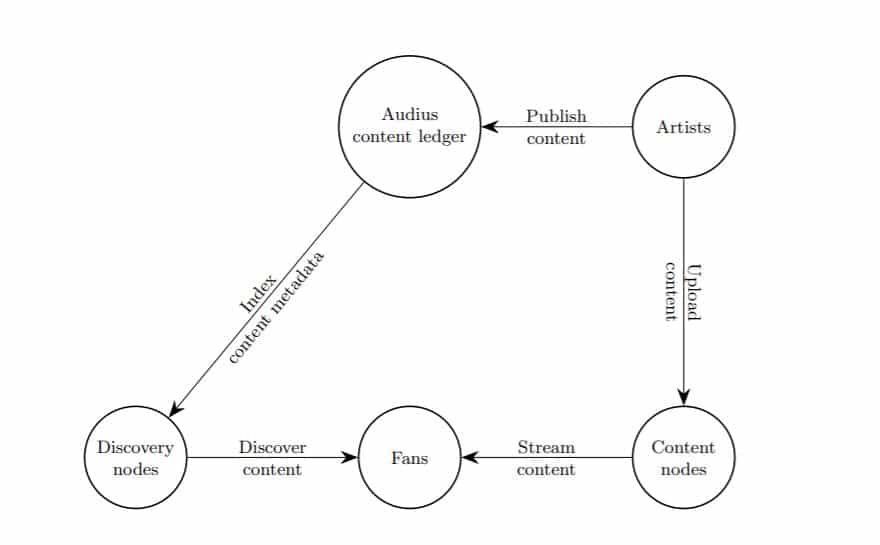 The Audius content lifecycle. Image via Audius whitepaper.
The Audius content lifecycle. Image via Audius whitepaper. - AUDIO token, stablecoins, and artist tokens. The AUDIO token is the platform utility token that will power the ecosystem. It will provide incentives that align the activities of all the participants in the ecosystem and will provide the network with governance, security, and access.
- Content Nodes. These are the user operated nodes where user-generated content will be hosted, and permission for accessing that content is granted.
- Content Ledger. The content ledger provides a single source of truth regarding all the data stored and accessible on the Audius protocol. One of its primary roles is to anchor the references to all the content hosted by the content nodes.
- Discovery Nodes. This is another user-operated network of nodes that indexes the entire Audius content ledger to provide an interface for easily querying the ecosystem to retrieve metadata.
- The governance mechanism might be the most important of the five components since it provides a way to make future modifications to Audius, and to suggest and vote on improvements to the ecosystem. Governance is provided by all of those who are holing AUDIO tokens. In this way the direction and success of Audius is left directly in the hands of the music creators and users of the platform.
Content Nodes
The content nodes in Audius are responsible for maintaining the metadata and availability of content on the platform. To do this they utilize AudSP which is the Audius native extension to the interplanetary file system (IPFS). These nodes are run by actively staking node operators, which gives them the opportunity to earn a portion of the network fees. Alternatively, nodes can be run by the artists themselves to host and deliver their content.
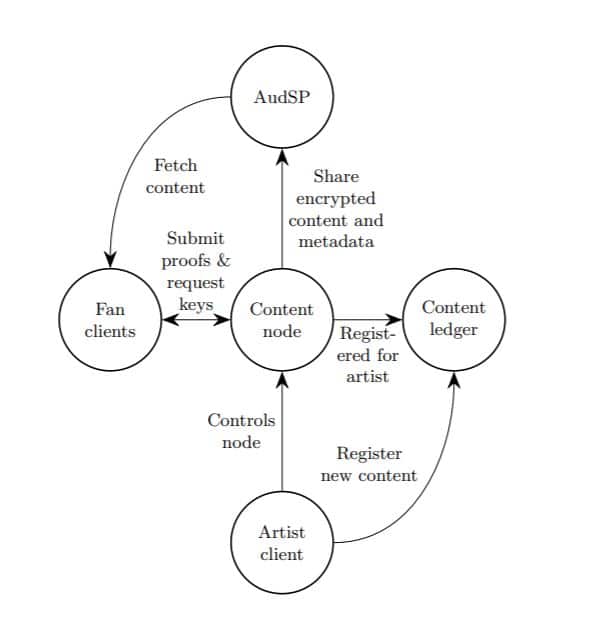 Content Nodes interacting with protocol participants. Image via Audius whitepaper.
Content Nodes interacting with protocol participants. Image via Audius whitepaper. These self-hosted content nodes give the artists a greater degree of control over their own content and the ways in which it is accessed, distributed, and delivered. It does this in two ways:
- Allows the artist to keep control of the content encryption keys;
- Allows for custom permissioning extensions not native to the Audius protocol.
AudSP: A Decentralized Storage Protocol
All of the files being distributed by Audius are required to remain highly available at all times. In addition they must be decentralized and independently verified. These three principles are the keys to ensure that the participation and accessibility of the platform for all users remains democratic.
This includes artists who are sharing their audio and metadata, fans who are retrieving and listening to the content, and node operators. All three groups use the protocol to share information, and all the references to the data remain in the Audius content ledger. In addition, the storage protocol is expected to deliver an equivalent user experience to any existing centralized solutions, and it is required to scale effectively as the network demand increases.
The use of IPFS for delivery enables modular object-level encryption of data, global distribution capability, object immutability, and secure content addressing. To ensure that stored files remain highly available the AudSP provides a staking-based incentive system for users who host the content on the network.
File references and associated metadata stored in the Audius content ledger will be IPLD links. As the decentralized storage market matures, the Audius protocol may be extended to include other storage solutions such as FileCoin, Sia, Swarm, or others.
Content Ledger
The Audius content ledger is comprised of smart contracts hosted on the Ethereum network, the POA network, and in the future can also include other L1 and L2 blockchain networks capable of hosting Audius content. Different parts of the Audius protocol will continue to run on different blockchain-based platforms, or utilize off-chain scalability solutions, where scalability trilemma tradeoffs can be made on a module and subprotocol-specific basis.
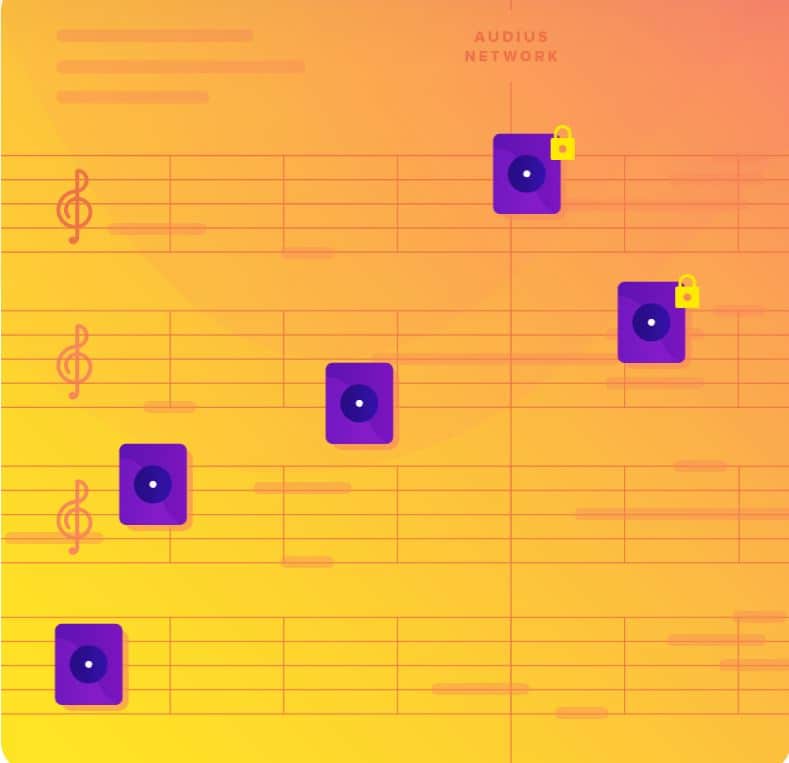 The content ledger contains all the information about content stored on Audius. Image via Audius.org
The content ledger contains all the information about content stored on Audius. Image via Audius.org Today, the content ledger for Audius includes:
- A consistent audio content and metadata format specification to ensure accessibility
- A decentralized process for artists to control:
- Track content
- Revenue splits
- Content ownership structure
- A registry of all nodes reachable in Audius
- The social graph of all users interacting with Audius
- Implementations of the token and governance systems
After generating upload artifacts from their content nodes an artist can add their content to the content ledger via a new transaction. The artist can then modify track content/metadata by sharing the modified content to AudSP and updating the metadata IPLD link in the content ledger.
Once content is listed in the content ledger, it is indexed by the discovery nodes which ultimately makes it easily queryable and discoverable by clients accessing Audius.
Discovery Node
Audius also requires some mechanism for indexing all the content and metadata that is efficiently searchable by users in order for them to discover that content on the network. This is handled by the discovery node, and based on the philosophy and mission of the project this index has the following requirements:
- It must be decentralized;
- It must also be efficient and straightforward for user clients to use, promoting accessibility and consumption of the content;
- It must be provably correct and transparent, eliminating profit incentives to manipulate the results returned to users;
- It must be extensible, so that the Audius community can explore different ranking and searching methodologies.
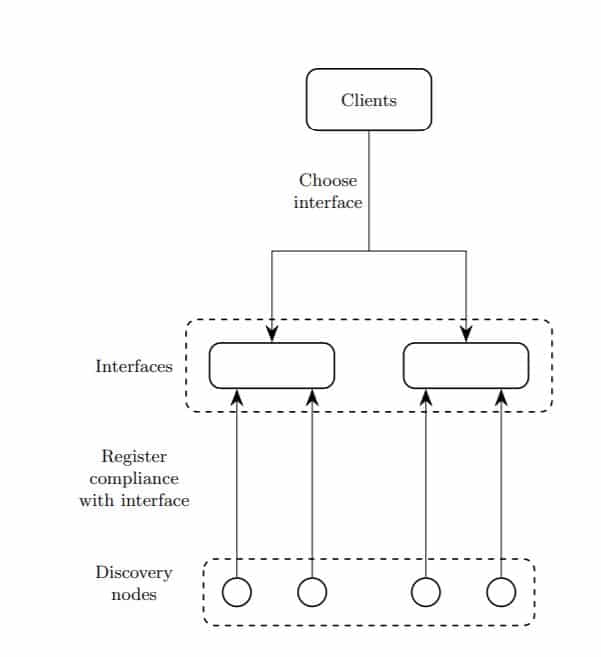 Indexing content is handled by Discovery nodes. Image via Audius whitepaper.
Indexing content is handled by Discovery nodes. Image via Audius whitepaper. Discovery node operators on Audius earn revenue by registering a discovery node with an active network stake. This allows them to earn a portion of the Audius token issuance and the aggregated fees generated on the network. The fan clients select which discovery node to query from the content ledger’s node registry.
Audius Governance
In order to create a network that is community-owned and operated all the key actors within the protocol (creators, consumers, and token holders) are empowered to modify and improve on the protocol by making changes to the parameters that shape the Audius protocol.
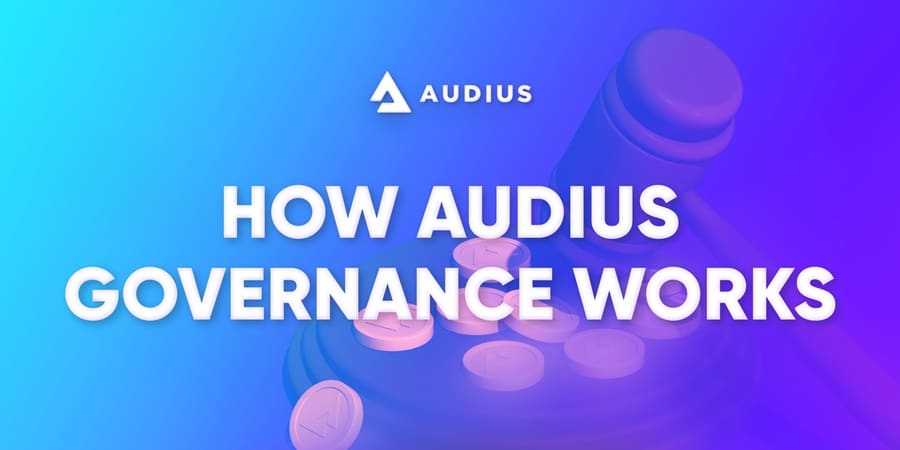 Community owned and operated. Image via Audius Blog.
Community owned and operated. Image via Audius Blog.These changes include, but are not necessarily limited to:
- Feature Integrations
- Royalty Rates
- Token Distribution
- Fee Pool Allocation
- Staking Rewards
Every parameter and feature of Audius is subject to governance, and each token issued on the Audius platform gains governance at the ratio of 1 token equals 1 vote. There is a difference in Audius politicians however in as much as artists and creators are different from node operators, yet it is understood that all participants should be aligned in the growth of the protocol.
In the case of node operators the governance system of Audius acts as a way to empower the decentralized content storage, providing them with a direct incentive for rewards to be earned and amended in line with the costs, value, and consensus of any other provider on the network.
Governance also includes a short-circuit process that allows for proposals to be passed without a broad vote when urgency requires such. This can occur due to an attack on the network or direct exploitation of some vulnerability in the protocol. It can also occur as a veto to a proposal that is not consistent with the philosophy or mission of the Audius protocol.
$AUDIO Tokenomics
Audius uses the $AUDIO token to align financial incentives with governance in an effort to consistently increase the usage of the protocol and the create a long-term value in the protocol.
The $AUDIO token was created with three methods of functionality within the protocol, with each unlocked by staking. These three methods are:
- Security
- Feature access
- Governance
Audius tokens can be staked in order to provide collateral for value added services on the network. In exchange for this the stakers receive several benefits which include access to exclusive features, governance rights, and a portion of the ongoing issuance of AUDIO tokens.
Node operators stake AUDIO tokens to secure and run the Audius protocol, and by artists and creators to unlock exclusive features or services. Each AUDIO token staked within the protocol receives governance weight and this can be used to submit proposals and to vote in order to shape the future of the protocol. In the future Audius tokens will also be used as collateral for artist-based tooling within the network.
Some early examples of this include artists tokens, badges, and earnings multipliers. In future iterations users and fans could delegate specific tokens to artists and curators in order to share in their growth on the platform and the issuance of future tokens.
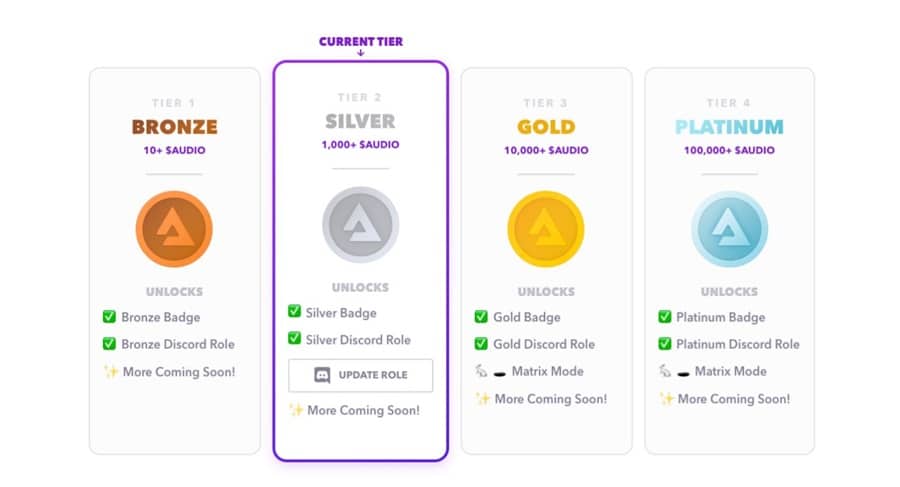 Audius badges are one of the first ways for users to unlock new features. Image via Audius Blog.
Audius badges are one of the first ways for users to unlock new features. Image via Audius Blog. Node operators are required to stake tokens in order to operate a discovery or content node (currently (200,000 AUDIO), and larger stakes equate to a greater probability of being chosen by fan clients. Nore operators are rewarded with additional AUDIO tokens and the potential for future protocol fees for actively supporting the protocol. Those who don’t have enough tokens to run their own node are able to delegate tokens to nodes and receive a proportional slice of the rewards.
A community goal, via governance, is to ensure that Audius tokens are always being funneled to the most value-added actors by using onchain metrics as a measurement, rather than simply to those staking the most tokens but not actively participating in the ecosystem.
Stablecoin Payments
In the future the Audius community could vote to use third-party stablecoins as a means for unlocking paid content. This would be a good mechanism for enabling creators to set custom rates, and for fans to issue fractional payments without much friction. In this case it is probable a protocol fee would be captured as a percentage of any stablecoin transaction. These fees would then be aggregated into the payment pool for node operators.
Artist Tokens
Governance could allow for artists creating a distributing their own unique tokens through Audius. These artist tokens could give fans the ability to unlock exclusive content. Artists would need to stake AUDIO tokens to create the artist tokens, and would be able to reach out to Audius representatives on the best practices for the creation and usage of custom tokens in the Ethereum and Audius ecosystems.
 Artist tokens could be used to unlock exclusive content. Image via Audius.co
Artist tokens could be used to unlock exclusive content. Image via Audius.co Audius serves as an aggregator of artist tokens across issuance platforms such as Roll, Zora and Rally—any interoperable token can be allocated with the protocolnative distribution mechanisms.
The Audius Team
Audius is a team of entrepreneurs, engineers, audiophiles, and blockchain experts. The stated mission of the project is to empower a new generation of audio artists on the decentralized web. The project is led by the two co-founders Roneil Rumburg and Forrest Browning.
 Audius co-founders Roneil Rumburg and Forrest Browning. Image via Audius.co
Audius co-founders Roneil Rumburg and Forrest Browning. Image via Audius.co Roneil Rumburg - Co-Founder & Chief Executive Officer
Roneil most recently co-founded Kleiner Perkins' early-stage seed fund. At KP, he was responsible for seed investments into Blockchain and AI companies, including Lightning Labs. Roneil attended Stanford University and previously co-founded a Bitcoin peer to peer payment company called Backslash.
Forrest Browning - Co-Founder & Chief Product Officer
Forrest is a Forbes 30 Under 30 recipient, and most recently was a Co-Founder of StacksWare, an enterprise datacenter management platform started from a Stanford University research project. The company provides analytics at scale for Fortune 500 customers, and was successfully acquired in late 2017.
$AUDIO History
The AUDIO token was created with a pre-mine of 1 billion tokens at the mainnet genesis in October 2020. These tokens are set for distribution as follows:
- 5.5% (55 million) as an airdrop to early adopters and artists.
- 17.8% (178 million) to the Open Audio Foundation treasury to act as a reserve that can be distributed based on governance votes.
- 40.6% (406 million) reserved for Audius founders, employees, and strategic artists/advisors. These are on a three year lock schedule with quarterly unlock events. This bucket includes roughly 80 individuals, including some of the key artists on the platform.
- 36% (360 million) to investors who participated in the previous Audius seed and funding rounds. These are subject to a two year lock schedule with quarterly unlock events.
In addition to the pre-mine Audius features a 7% genesis annual issuance rate, used to continually reward the protocol’s most active users, rather than simply allowing tokens to be hoarded by a few early adopters.
At launch the AUDIO token was trading around $0.485, but it rapidly declined and within weeks was below $0.10. It was able to recover somewhat and spent the next few months trading in the range of $0.15 to $0.20, which was still considerably below the launch price.
Soon however it was caught up in the 2021 bull market in cryptocurrencies which saw it shoot to a high of $4.99 by March 27, 2021. Since then it has declined significantly from its highs and as of April 20, 2021 it is trading at $1.96.
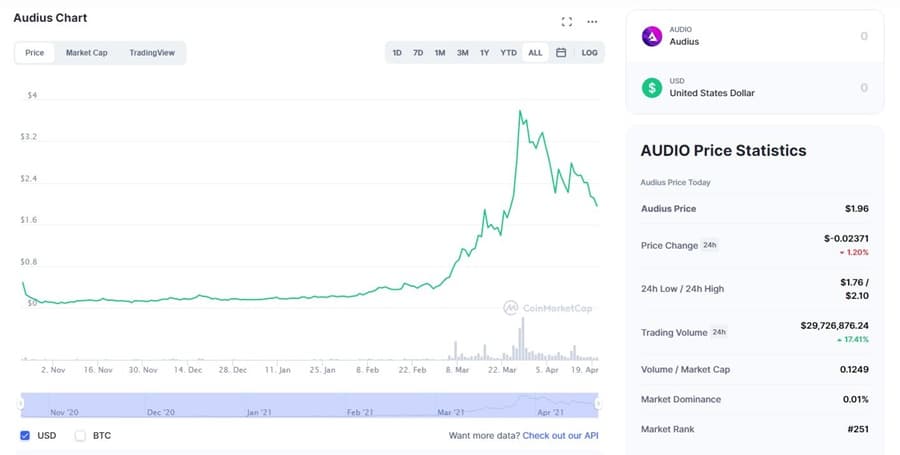 The price history of the AUDIO token. Image via Coinmarketcap.com
The price history of the AUDIO token. Image via Coinmarketcap.comObviously this is quite volatile, and there’s no way to say whether the token will recapture its highs, or continue declining back to the levels seen in late 2020.
Those interested in purchasing AUDIO tokens have an increasing number of choices, and the largest volumes for AUDIO can be found at Binance. There is also a small amount of volume on Uniswap v2 and on FTX.
The Future of Audius
According to the Audius whitepaper:
The Audius community will roll out new mechanisms for content ownership and revenue never before possible, backed by the crypto-native primitives driving the protocol under the hood. As a platform well poised to bridge the gap between crypto and a mainstream audience, Audius will always prioritize simplicity to offer an intuitive user experience grounded in web3.
This will be accomplished via the governance model that enables active participants on the network to dictate the protocol changes that effect the distribution of AUDIO tokens and the usage of the platform.
If they wish to maintain their governance weight the users of the protocol will need to continually find value-added contributions or risk having their governance power diluted or even replaced by others who are more interested in the long-term development of the platform.
In this way Audius plans on remaining user-owned and controlled in perpetuity, with community governance continuing to lead the way forward at all times.
In terms of community-owned and controlled streaming platforms, Audius is a pioneer, and plans on remaining at the forefront of the industry. This will be possible thanks to the formidable community that has been built around the Audius protocol. This community has grown rapidly and is approaching 1 million users just a few years after the idea for Audius was born.
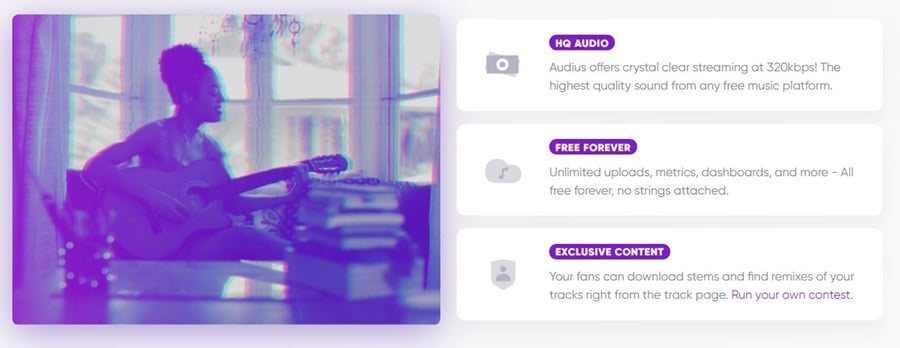 Audius is primed to continue growing and serving its user-owned base. Image via Audius.co
Audius is primed to continue growing and serving its user-owned base. Image via Audius.co Incredibly Audius has grown this rapidly primarily through word of mouth. What is missed by some is that Audius not only empowers creators, it also empowers markets since it allows anyone to become a talent scout and agent.
And they can then capture value from that activity by bringing additional talented artists and passionate fans to the platform. As a community-operated platform these agents retain a high degree of control and leverage within the protocol, giving them an incentive to keep it strong and active.
Thanks to the work and dedication of the early adopters Audius has grown incredibly in its first two years of existence, but this is thought of as just the beginning. And thanks to the decades of music industry history Audius is able to adopt only the best practices of creation, distribution, governance, and token mechanics to create the most valuable streaming music platform in existence.
The eventual goal is to take over the space and replace the centralized streaming platforms which only exist to serve advertisements, not to further the creation and enjoyment of music.
Artists are encouraged to use this time to make their mark as early adopters of the platform. Obviously there are many ways to both create and extract value with the platform, and every artist should be able to create their own opportunity. The same is true for fans, curators, and talent scouts. These early days are the perfect time to begin sharing in the benefits provided by decentralized, community-owned music streaming.
There are many out there that have suffered from the existing centralized music industry, and now is the time for artists to regain control of their own future. Audius is the means to create a new path for the music industry, one that is controlled by the creative forces behind the music we all love. This path is one that will be fully grounded in sovereignty and decentralization.
Conclusion
Audius is far from the most high-profile of Ethereum dApps, however the amazing growth of the platform in a short period of time is encouraging. Can this be a Soundcloud killer that empowers the creative community of musicians and artists as never before? The potential for that certainly exists, but only time will tell if the project succeeds or not.
The trend towards decentralization and community-ownership certainly plays in the favor of Audius, if it continues. The risks in the project are real, but the potential rewards are also very real. The future success or failure is in the hands of the musical community.
In the meantime you may want to join in if you are passionate about music. Otherwise you can keep your eye on this project to see if it remains on track to become the dominant music streaming platform.



